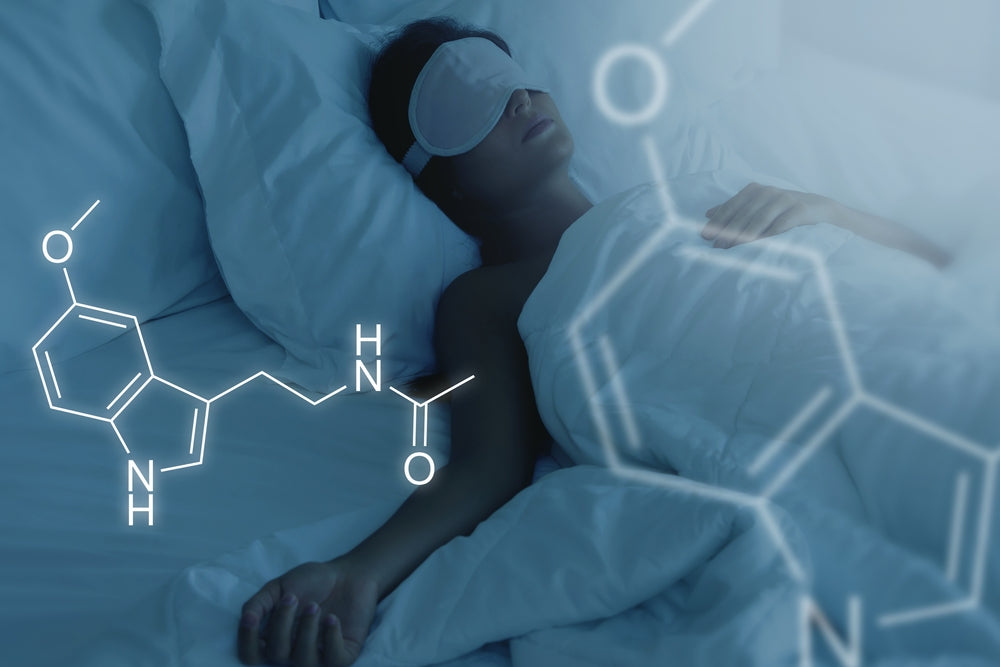Free U.S. Shipping On Orders Over $150

The Role of Hormones in Sleep
Posted on
Numerous body processes and functions are controlled by hormones from your sex drive to how your body regulates pain. Sleep is also regulated by hormones.
You probably already know about melatonin, what’s called the sleep hormone. But there are several more hormones involved in the sleep-wake cycle. Here are the most important ones and their role.
1. Melatonin
We’ll start with the main sleep hormone, melatonin. It is also known as the hormone of darkness, because it is produced in response to, well, darkness.
As light fades in the evening, the pineal gland starts producing more melatonin. Melatonin does not put you to sleep; rather it puts you in a relaxed and calm state that helps you go to sleep.
A reduction in melatonin production, usually because of exposure to light at night, can make it harder to fall asleep. That’s why it is a good idea to switch off devices an hour or two before bed.
By the way, while we call melatonin the sleep hormone, sleeping is actually just one of the many functions it has in the body. It regulates other functions including menstrual cycles, blood pressure, cell protection and so on.
2. Cortisol
Cortisol is well known as the stress hormone. One of its functions is to regulate the body’s stress response. An increase in the production of cortisol makes you more alert.
Cortisol levels start dropping in the evening as we calm down and get ready for sleep. It drops to its lowest level at around midnight.
In the morning, the body ramps up production of cortisol to help us wake up and stay alert. Melatonin helps you sleep and cortisol wakes you up.
If cortisol levels remain too high in the evening, it can make it harder to sleep and cause or worsen insomnia. This is because it keeps your body and mind alert, which inhibits sleep.
Too much stress or anxiety can cause heightened cortisol levels at bedtime. That’s why a bedtime routine that involves relaxing activities like breathing exercises, reading, or meditation can be really helpful in fighting insomnia.
Good to know: Like melatonin, cortisol has numerous functions in the body. In addition to managing our response to stress, it also regulates metabolism, blood pressure, blood sugar and more.
3. Endorphins
Endorphins are a group of hormones that the body releases in response to pain, stress and pleasure. They are the body’s natural mood boosters and pain relievers.
Endorphins are the only hormones among the ones we’ve discussed that don't have a direct impact on sleep. Instead, they affect sleep in a more indirect way.
Exercise, sex, massage, social activities — all these are things that increase endorphins in the body. Endorphins are known to boost mood, reduce stress, make you less anxious, and reduce pain and inflammation. All these are things that help you sleep better.
So doing things that produce endorphins is good for sleep. It’s one of the reasons why exercise helps with insomnia, why you sleep better after a day hanging out with friends and why sleep comes easily after steamy sex.
4. Cortistatin
Cortistatin is not as well known as the hormones above. But it is no less important for good sleep. Cortistatin is a peptide hormone that plays a hugely important role in slow wave sleep (you can learn more about sleep stages in this earlier blog post).
Production of cortistatin during stage 3 of sleep (NREM slow-wave sleep) slows down the firing of neurons and inhibits body movement. Your body goes into a deep and restful state that is crucial in recovery, healing, muscle growth and cognitive function.
5. Sex Hormones
When we talk about sex hormones and sleep, it’s often related to how lack of sleep affects testosterone, estrogen and progesterone.
But sex hormones can also affect your sleep quality. An imbalance in sex hormones, caused by illness, age, menopause or some other cause, can lead to various sleep problems.
Take testosterone for example. Low T has been linked to poor sleep quality in men, and is even thought to contribute to sleep apnea.
It is not clear why testosterone affects sleep but it could be related to other effects of low T including fatigue and depression. Some studies also show that low T causes an increase in cortisol levels. As we have already discussed above, cortisol is an alert hormone that inhibits sleep.
Men with low T tend to have trouble going to sleep and their sleep is not as deep.
Similarly, estrogen and progesterone in women can mess up with sleep patterns. If these hormones are out of whack, they can cause symptoms like hot flashes and night sweats that affect sleep quality.
These sex hormones also have a direct impact on sleep. For instance, estrogen plays a crucial role in tissue absorption of magnesium. Magnesium is involved in the production of melatonin, so low estrogen can reduce magnesium absorption, which makes it harder to sleep and prevents deep sleep.
What Can You Do?
In many cases, a healthy lifestyle will help your body maintain the production of the right hormones for sleep.
For example, a healthy diet and turning off devices before bed will ensure plenty of melatonin is produced, which makes sleeping easy and fast. Working out produces more endorphins, which boost your mood and reduce stress, ensuring better sleep.
In other cases, you may need medical intervention to get your hormones in line. For instance, doctors often prescribe hormone replacement therapy for menopause. It may also help men with low testosterone.
Quick links
Contact
6063 Hudson Road #160
Woodbury, MN 55125
Yo@hercLeon.com
Leave a comment: